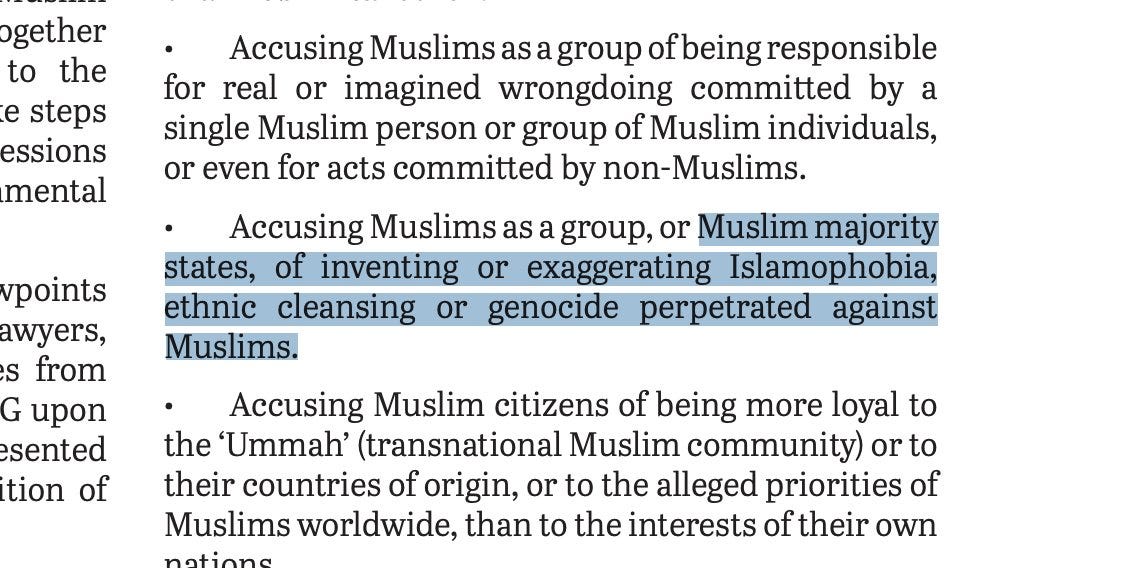What's in a definition?
The Labour Party has accidentally called itself islamophobic. And by this definition you probably are too.
In 2018, the All Party Parliamentary Group on British Muslims published a report entitled Islamophobia Defined: The inquiry into a working definition of Islamophobia.
It was a comprehensive and substantial piece of work, co-chaired by then Tory and Labour MPs Anna Soubry and Wes Streeting. Dominic Grieve KC wrote a foreword.
Within the 72 page report were a series of examples of what might be defined as ‘islamophobic’. The report reads “contemporary examples of Islamophobia in public life, the media, schools, the workplace, and in encounters between religions and non-religions in the public sphere could, taking into account the overall context, include, but are not limited to:” before listing examples ranging from the reasonable, sensible, and obvious … to the ludicrous.
One staggering example of ‘islamophobia’ within the report reads thus:
“Accusing Muslims as a group, or Muslim majority states, of inventing or exaggerating Islamophobia, ethnic cleansing or genocide perpetrated against Muslims.”
The observant reader might note that by this definition if you accuse one of the “Muslim majority states” of “exaggerating islamophobia”, you are yourself an ‘islamophobe’.
Now say that Iran might want to weaponise an accusation for geopolitical gain. If you call out this evil regime, you’re an islamophobe.
Say Afghanistan under Taliban rule decrees girls going to school is against the teachings of the Quaran, and only ‘islamophobes’ disagree. Call that out and you’re an ‘islamophobe’.
Say Saudi Arabia says putting gay people to death is in line with its Islamic values, and only ‘islamophobes’ would disagree. Stand up for gay rights and you’re an ‘islamophobe’.
But it’s deeper than that.
If you accuse Muslims or Muslim majority states of inventing or exaggerating a genocide, you are an islamophobe. A reasonable interpretation of this example would be to say ‘if you do not agree there is a genocide in Gaza’ (as many Muslim majority states do) ‘then you are an islamophobe’.
And here’s the rub. The Labour Party itself does not agree there is a genocide taking place in Gaza, just because some Muslim majority states say so. The Labour Party itself takes the reasonable position that the case of both sides must be heard. That no judgement should be rushed to. That just because a Muslim majority state says something does not make it so.
Yet the Labour Party (along with the Lib Dems) accepted this APPG’s absurdly broad definition of ‘islamophobia’. Therefore by the examples set out to illustrate their own definition, the Labour Party is an islamophobic party.
Indeed Wes Streeting, himself a co-chair of the report, is by this definition an ‘islamophobe’ - as he has not rushed to judgement on accusations of a genocide in Gaza.
And more than that, the UN International Court of Justice is also 'islamophobic' - as it has not immediately agreed with the case that there is a genocide taking place in Gaza. Indeed, as any court should - it is hearing both sides. And therefore by this definition could be considered ‘islamophobic’.
The examples within the APPG report go on. As historian Tom Holland pointed out in 2019, “The definition of Islamophobia the Government is being asked to approve is one that threatens to criminalise "claims of Muslims spreading Islam by the sword or subjugating minority groups under their rule". But most Muslims, for most of history, would have been fine with these claims”.
He went on to write that “We risk the ludicrous situation of being able to write without fear of prosecution about the Christian tradition of crusading or anti-semitism, but not the Islamic tradition of jihad or the jizya.”
But beyond the many examples in the “non exhaustive” list helpfully provided by the APPG on British Muslims, there is something deeper going on here.
Why are we trying to define ‘islamophobia’ at all?
As gay rights campaigner Peter Tatchell said on my GB News show earlier this week, “we must protect people, but Islam is an idea, and like all ideas, it should be open to criticism.”

He went on to say he favours the use of the term “anti-Muslim prejudice”.
“So, strictly meaning, Islamophobia means fear of Islam. Now, if you're a gay person, or a woman, there are some aspects of Islam, or some interpretations of Islam, which rightly make you fearful. If you live in an Islamic-majority country, most of them are dictatorships with appalling human rights records. So, I want to say, let's use the term anti-Muslim prejudice to focus on protecting Muslim people, not protecting the idea of Islam. Because like all ideas, it should be open to scrutiny and criticism.”
This is a key point. Islam is an idea. It’s not in and of itself a people, a race, or an immutable characteristic.
We must be free to be critical of ideas. Many would say it’s rational to be ‘fearful’ of some ideas of how society should be run. Ideas are there for robust debate. Even mockery.
It is entirely possible to defend Muslim people from bigotry, whilst not introducing blasphemy laws around the teachings of very old books, or giving vile medieval regimes a free pass on their own bigotry.
The term ‘islamophobia’ helps no one. It muddies the waters, and conflates criticism of people with criticism of ideas.
It’s better for everyone - perhaps especially British Muslims - to move away from any impression that some ideas must be protected from debate. That impression in and of itself is a conduit for bigotry.
Far better to focus on individuals. On standing up for British Muslims against racialised attacks. On ensuring British Muslims, as all people, can live their lives free from fear or favour.




